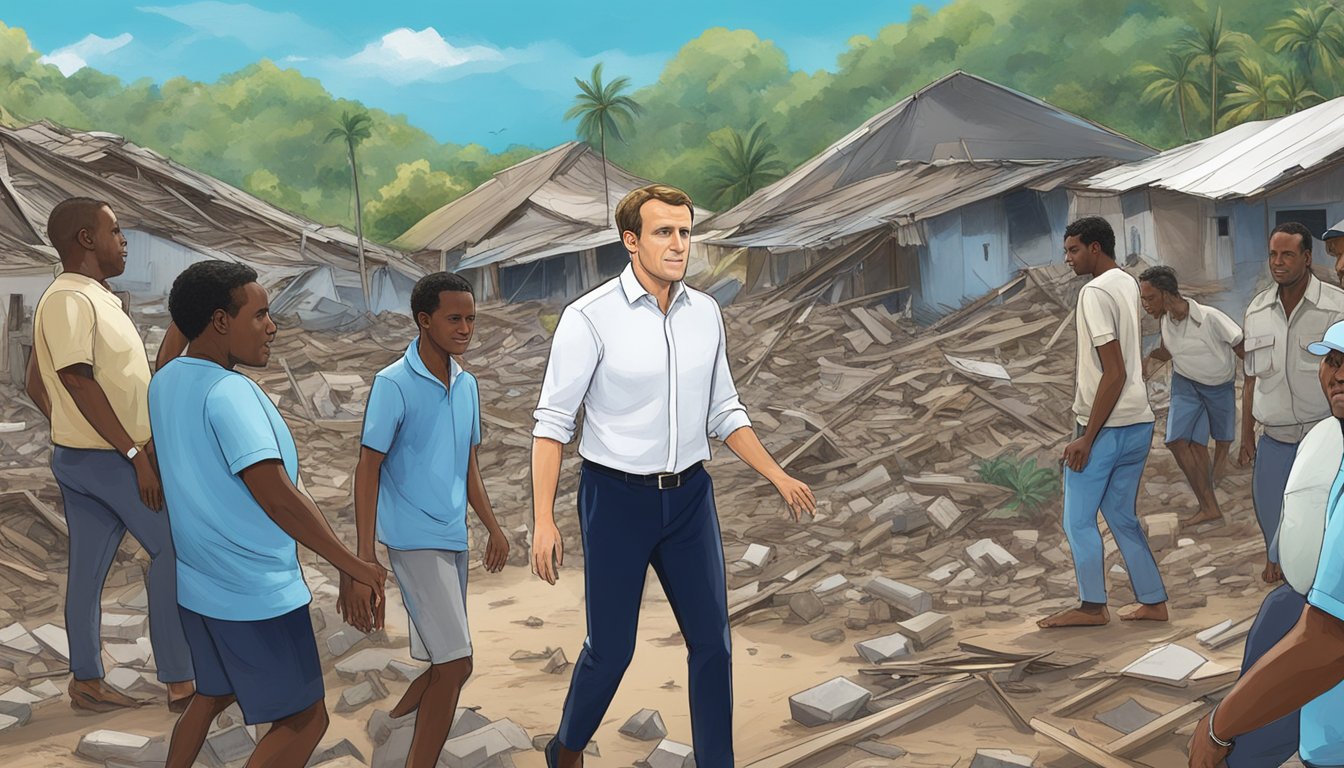MAMOUDZOU, Mayotte — On Thursday, French President Emmanuel Macron took a firsthand look at the destruction wrought by Cyclone Chido during his visit to Mayotte, an island nestled in the Indian Ocean.
This cyclone, one of the most powerful storms to hit the region in nearly a century, has left a trail of devastation.
As Macron stepped off the plane, he was greeted by Assane Haloi, a security agent who painted a grim picture of the situation.
She reported that since the cyclone struck on Saturday, residents have been grappling with severe shortages of water and electricity.
The storm’s impact was so devastating that numerous families found themselves without adequate shelter, resorting to makeshift coverings amid the ruins of their homes.
Casualty Figures and Concerns
While French authorities have confirmed at least 31 fatalities and over 2,000 injuries, with more than 200 considered critical, there are fears that the actual death toll may be much higher.
Some estimates suggest it could reach into the hundreds or even thousands.
Following the cyclone, media organizations, including The Associated Press, gained access to the island to report on the survivors’ experiences.
In Kaweni, a shantytown on the outskirts of Mamoudzou, the remnants of homes were strewn everywhere — blocks of corrugated metal, bits of plastic, and personal items littered the ground where families once lived.
The emotional toll weighed heavily on residents.
One man, Nassirou Hamidouni, sifted through the rubble of his former home, sharing his profound sadness and sleeplessness triggered by the disaster.
After surveying the damage from the air and visiting a local hospital, as well as the struggling Kaweni community, Macron described the experience as unforgettable.
At the hospital, a staff member appealed for help, highlighting the immense strain on the local healthcare system.
Basic Necessities in Short Supply
The cyclone inflicted substantial damage on Mayotte’s infrastructure, leaving many without power and running water.
Public health officials voiced concerns about potential disease outbreaks stemming from the lack of access to clean water, as grocery stores quickly depleted their supplies and long queues formed at gas stations.
Desperate for drinking water, residents like Ramou Madi, a mother of two, described the chaotic struggle to secure even the most basic necessities.
She recounted how finding drinking water took precedence over food, illustrating the prevalent sense of urgency and distress.
In response to the challenges faced by the population, Macron assured them that substantial aid was on the way.
This included food, medical supplies, and additional rescue personnel.
A navy vessel had already delivered 180 tons of assistance, and plans for a field hospital were in motion.
Tensions flared during Macron’s visit when a local criticized him for appearing disconnected from the plight of those on the ground, particularly in areas without water for nearly a week.
Macron explained the military’s logistical challenges in delivering aid, stating, “Restoring electricity and water systems is a priority, but it may take weeks for remote regions.”
He also discussed the deployment of approximately 1,200 police officers to maintain order and discourage looting.
Despite the high number of undocumented migrants on the island, Macron stressed the importance of providing aid impartially.
He mentioned conversations with doctors who encountered patients with untreated injuries desperately needing medical care.
Acknowledging the anguish of residents uncertain about the fate of their loved ones, he highlighted that many deceased had not been reported due to pressing burial customs.
Macron promised that communication services would be restored soon to help people report missing individuals.
Rebuilding a Stricken Island
With a population of around 320,000, including an estimated 100,000 migrants, Mayotte stands as France’s poorest territory.
The island has remained a French region since a referendum in 1974 separated it from the rest of the Comoros islands.
The cyclone wreaked havoc on neighborhoods, with many people dismissing the storm’s severity and ignoring warnings.
Signs of hardship were evident everywhere: families sought refuge in schools, and women washed clothes in buckets.
Throughout his interactions with the community, Macron displayed empathy and a genuine understanding of the residents’ struggles.
He recognized their resilience in the face of adversity and proposed legislative measures aimed at expediting the rebuilding process.
He emphasized the need for durable housing to replace substandard structures.
Drawing a parallel to the recovery efforts following the devastating fire at the Notre Dame Cathedral, Macron expressed his determination to see Mayotte restored.
He declared that failing to rebuild the island would be unacceptable, especially given the rapid progress achieved elsewhere in recovery efforts.
Source: Stripes

